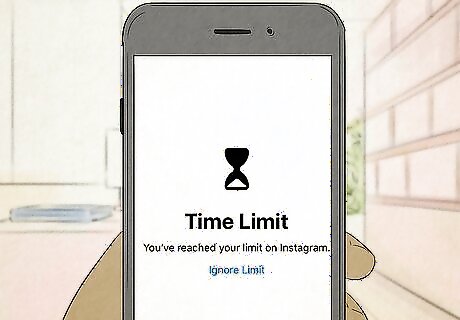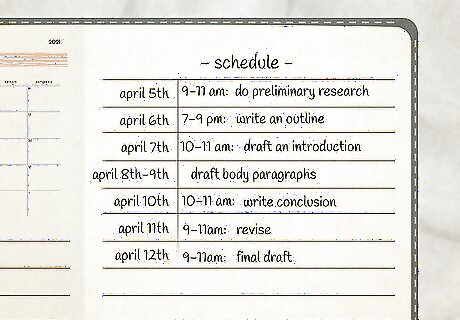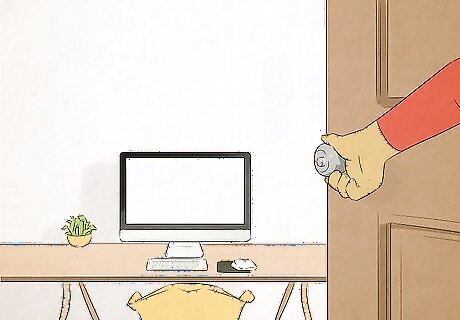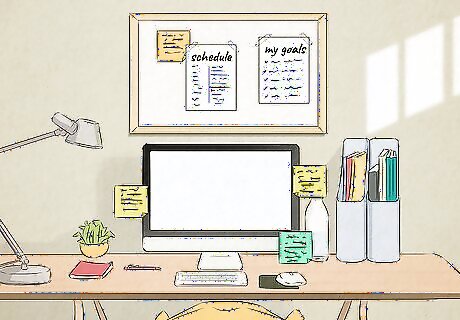
views
Move around or stretch while you work.

Science shows that you learn and think better when you move. When you sit still for too long, it’s easy to get bored, restless, and distracted. Get up and walk or stretch occasionally, or even do jumping jacks or run in place for a couple of minutes. Standing up while you work is also a great way to boost your focus. Try sitting on an exercise ball or wobbly chair when you’re doing your homework. The movement may help you stay focused.
Fuel up with water and healthy snacks.

It’s really hard to concentrate and learn if you’re hungry or thirsty. Keep a water bottle or thermos by you while you work, and take sips if you start to feel tired or distracted. Have some healthy snacks ready to go in case you get hungry. Some good study foods include: Apple slices with peanut butter Nuts, especially almonds Greek yogurt Fruit salad Dark chocolate
Put away anything that might make it hard to concentrate.

If you can’t stop looking at your phone, put it out of reach. You could stick it in a desk drawer or inside your bag. Close your computer or switch off your tablet unless you need them for your homework. Turn off the TV or any music that might make it hard for you to focus. Some people actually concentrate better with a little noise in the background. If it helps you to have some quiet music on, that’s totally fine! But if you find that it distracts you, turn it off.
Block distracting apps and websites on your computer or tablet.

If you have to do homework on a device, focusing can be hard. Apps like Forest, Screen Time, and OurPact help keep you away from common distractions. If you’re a kid, ask a parent or other adult to help you install one of these apps. For example, you might need to block apps or websites like Facebook or YouTube while you’re working. If you get alerts or notifications on your device, turn them off so they won’t distract you. The last thing you need is your tablet blowing up with Facebook notifications while you’re trying to work!
Work on one assignment at a time.

Multitasking will actually make you less productive. If you’re doing your math homework, don’t try to listen to a video lecture about biology at the same time. You might feel like you’re getting more done, but it’ll actually slow you down! Wrap up one assignment before you move on to the next. Don’t try to text your friends or have a conversation with a family member while you’re doing homework, either.
Break your assignments into smaller tasks.

Focusing on one task at a time makes the work easier. Make a list of the steps you need to do for each assignment. Finish one task before moving on to the next one. You can even set a timer so you don’t spend too long on each part. For example, if you’re supposed to read a book chapter and write a report, start by skimming the chapter headings for important points. Then, read the whole chapter and take notes. Next, make an outline for your report. After that, write the report, and finish up by checking it for mistakes. If you have more than one assignment to work on, make a to-do list and put the hardest or most important projects first.
Redirect your attention if you notice your mind wandering.

Getting distracted is totally natural. If you realize that you’ve started daydreaming or thinking about things other than homework, don’t beat yourself up about it. It happens! Just gently turn your attention back to your work. With practice, you’ll get better at noticing and correcting yourself when you get distracted. It can help to pick a specific thing to focus on to bring yourself back to the present. For example, pay attention to your breathing or to any sounds you can hear around you. If you’re working with a friend or family member, ask them to help you stay on track. They can say something like, “Are you focused?” or tap you on the shoulder if they notice you getting distracted.
Fidget with something to help you focus.

Some people concentrate better if they have something in their hands. Grab a stress ball, a fidget spinner, or a ring of keys—anything you can fiddle around with while you work. If you need your hands free, try keeping your mouth busy by chewing on a piece of gum, a hard carrot stick, or a silicone mouth fidget. Fidgets are great concentration aids for some people, but are distracting for others. Don’t keep using a fidget if it’s taking your mind off your work.
Turn your homework into a game to make it more fun.

Pretend you’re on your own personal quiz show. Try setting a timer and seeing how many problems you can finish correctly in 5 minutes. Or, break out some flashcards and test your knowledge. If you set little goals for yourself and challenge yourself to complete them, even the most boring subjects will feel more fun! You can also turn it into a game with a friend or family member. For example, take turns quizzing each other and give points for each right answer. Whoever gets the most points wins the game. Or, if you’d rather not play a structured game, try making up a story about what you’re doing. For instance, if you’re studying history, imagine yourself living in the time period you’re learning about.
Try working with a study buddy.

Choose someone who works hard and won’t distract you. This could be a classmate, a friend, or even a sibling—just make sure they’re dedicated to getting work done instead of goofing off! If you can’t get together because of social distancing, have a virtual study session over Skype or FaceTime. You could even get together with a small group. Trade notes, quiz each other, or just hang out quietly while you all do homework together.
Take a break at least once an hour.

Set a timer if you have trouble remembering to stop. Working for too long in one sitting makes it harder to concentrate. During your breaks, spend about 15 minutes stretching, dancing around to music, having a snack, or even watching a funny video. You can also use a timer to make sure your breaks don’t go on too long. Remember, the sooner you get back to work, the sooner you can get it done! If you’re feeling really restless, frustrated, or distracted, it’s okay to take a break ahead of schedule. Give yourself a few minutes to unwind, then try again.
Pick a time when you feel awake and rested if possible.

You’ll focus better when you’re at your best. For example, maybe you feel most awake in the afternoon, the evening, or even early in the morning, before school starts. You’ll concentrate better if you do your work at one of those times! Make it a routine to do your homework at the same time each day. For example, if you’re an evening person, try doing it right after supper every night. Having a schedule will make your work feel less overwhelming. You can’t always choose the perfect time to do your homework, but having a routine can still help you get in the zone when it’s time to work! Once you pick a time, try to stick to it.
Study in a quiet, comfortable spot.

Try to find a space with lots of light and room to spread out. If you can, choose an area where you won’t be bothered by lots of distractions, like a loud TV or noisy siblings. Clear a space on a table or desk where you can set up your supplies, and grab a comfortable chair. If you’re studying at home with your family, ask them to keep it down while you work. Be careful studying in your room—if you use a space where you usually sleep or relax, it’ll be hard to get into homework mode! Set aside a spot just for homework, and don’t do your work in bed. Finding a good study space can be tough, especially if there are other people around. If you can’t find a quiet spot, put on some noise-canceling headphones. Listen to white noise or peaceful music without vocals to help you tune out background sounds.
Organize your study supplies.

It’s easier to focus when your stuff is easy to find. Keep your writing supplies in a pencil box or desk organizer, and sort your papers into folders by subject so you can keep track of them. If you like to nibble while you study, set your snacks out before you get started. If there’s stuff in your study space that you don’t need, take a few minutes to clean it up or put it away before you start working. Put completed assignments in their folders and throw away any trash.
Move to a new study spot if you’re feeling bored.

A change of scenery can wake up your brain and help you refocus. Try moving to a different room, going outside, or even doing your homework in a totally different location (like a study room at the library). You might find that being in a different environment helps you feel more alert and refreshed. Even changing your usual study space a little can help. For example, put up some new decorations or move to the other side of the dining table. It seems weird, but just the right amount of background noise can actually help you concentrate! That’s one reason some people work better in coffee shops or study halls.
Reward yourself with something fun when you’re done.

Pick something good so you’ll be motivated to finish. Take a minute to decide what you’re going to do before you even start working. When you treat yourself every time you get your work done, you might start looking forward to the work a little more! For example, you could watch an episode of your favorite TV show, play a game you like, or call up a friend.















Comments
0 comment